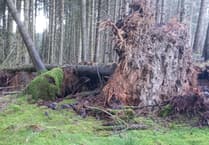The new gas pipeline being built between Milford Haven and Aberdulais will soon begin its passage beneath Canaston Woods in Pembrokeshire following months of careful planning by Forestry Commission Wales and National Grid. FC Wales, which manages the plantation on ancient woodland site (PAWS) on behalf of the National Assembly, has been working closely with National Grid to minimise the impact of the development on the woods. The 75-mile long pipeline across South Wales is essential to link two new gas terminals being built at Milford Haven to the National Gas Transmission System, which currently ends near Aberdulais. The 1,600-metre passage through Canaston Woods is considered to be the least damaging route to the environment because of adjoining wetland interests and is also favoured by the Countryside Council for Wales. Nevertheless, FC Wales and National Grid have been involved in months of talks to keep the impact on Canaston Woods to a minimum and to secure the future management of the area to be cleared after the pipeline has been laid. The steel pipeline is 1.2-metres in diameter and will be buried at least 1.2-metres deep but needs a 44-metre wide working area - known as the spread - to be fenced off along the whole of the pipeline length. Working closely with local FC Wales staff, National Grid has agreed a route which will have the least impact on the woods and, under FC Wales guidance, will put measures in place to assist restoration of the site once the work is completed. The pipeline is due to be finished by the autumn of 2007, but commencement of the work through Canaston Woods was delayed to avoid disturbing the protected birds of prey which may have been nesting in the area. "This was just one example of how the environmental considerations in the area had been sensitively balanced with the essential development of the pipeline," said Neil Stoddart, FC Wales planning forester for the area. "FC Wales holds good information on the flora and fauna of Canaston Woods, much of this obtained in partnership with stakeholders over many years, and we were able to apply this knowledge to good use during our negotiations with National Grid," said Neil. "The impact and short-term disturbance of just over seven hectares represents just two per cent of the wood and will be unlikely to damage the value of the woodland as a PAWS restoration site. By working with National Grid, we aim to ensure this is a case of short-term pain for long-term gain. Restoration may be delayed by a few years but by influencing the remediation work, the appearance of the woodland will be in line with our ancient woodland aims in, say, 30 years time." He added that, while there may be short-term inconvenience during construction work, all affected public access routes would be sensitively reinstated. During the planning, FC Wales and National Grid agreed to re-route the pipeline from its original course towards the woodland edge to reduce the impact on the established Class 1 ancient semi- natural woodland sites within Canaston Woods. This would also present an opportunity to create a 'woodland edge' effect post-construction, offering greater diversity for fauna and flora and creating an extension of the existing ancient hedgerow system. Andrew Souley, National Grid's project manager, said the company did its best to avoid the most sensitive areas when planning the pipeline route and ensured that, where work was necessary within these areas, every possible precaution was taken to prevent harm. "We employ specialist environmentalists to advise in planning the route, and they form an integral part of the construction team from the outset to ensure that we comply fully with all our commitments to protect the environment," he said. "We carried out Environmental Impact Assessments for various routes and the route through the woodland was the preferred option. We have worked closely with FC Wales to keep any damage to the woodland to a minimum and will continue to work with them on remediation work after construction." David Worrall, CCW's West Wales regional manager, said: "With output from the North Sea gas fields decreasing, the CCW recognises the strategic importance of this pipeline. CCW has worked and continues to work closely with National Grid and its contractors to ensure that any impact on the environment is carefully considered and kept to a bare minimum." He added: "Taking into account environmental sensitivities in the immediate area, CCW supports the route agreed through Canaston Woods and is confident the partnership approach adopted by FC Wales and National Grid will ensure the best possible outcome in this case."



